Medea Crosses the Border and Settles in Queens in Mojada
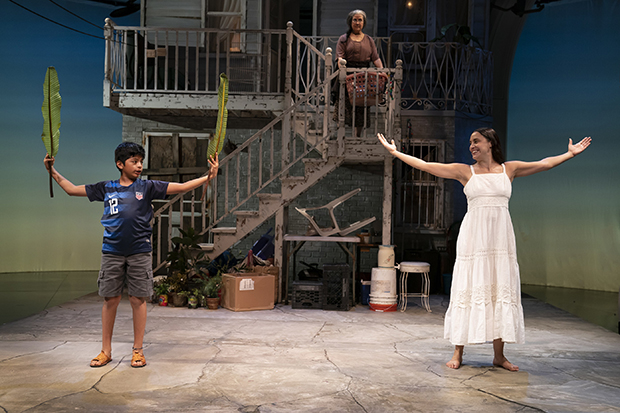
(© Joan Marcus)
Which is more powerful: the desire to see your children thrive, or the will to make your enemies suffer? As a sappy American marinating in our mythology of generational progress, I'm inclined to believe the former; but as a student of Greek drama, a nagging voice in my head suspects the latter. Did Euripides know better than Martin Luther King? After the arc of the moral universe bends toward justice, does it just keep bending back toward injustice, creating an inescapable cycle of history? Audiences will be left to decide after watching Mojada, Luis Alfaro's daring, imaginative, and unforgettable adaptation of Medea, now playing at the Public Theater.
Alfaro has authored a trilogy of Chicano adaptations of Greek tragedies (his work was last seen at the Public in the thrilling Oedipus El Rey). While his Oedipus and Electricidad (a take on Electra) are set in his native Los Angeles, Mojada takes place not far from the Public, in the Corona neighborhood of Queens.
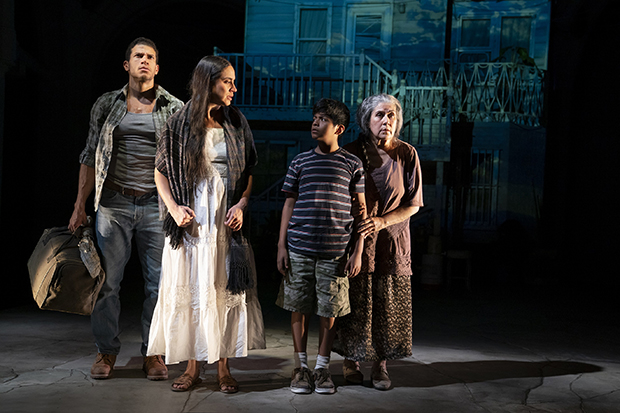
(© Joan Marcus)
Queens is where Jason (Alex Hernandez) has settled his family after a harrowing journey from Michoacán. His partner Medea (Sabina Zúñiga Varela), their son Acan (Benjamin Luis McCracken), and the elderly caretaker Tita (Socorro Santiago) now live in a fixer-upper a stone's throw from the 7 train. Their landlady is Pilar (Ada Maris), a Cuban immigrant who employs Jason for apartment renovations. Medea stays home and slaves over her sewing machine to bring in additional income. When it becomes clear that Pilar wants Jason for more than just his labor, Medea is left to decide if she will fade away or go out on a chariot of fire.
The provocative title is the Spanish equivalent of the English slur "wetback," but it also sounds strikingly similar to "Medea," which is just a hint of the colorful, acrobatic style in which Alfaro writes. In vibrant Spanglish, his characters discuss the immigrant hustle, and New York's mystifying mélange of cultures. "I sell to everyone," says Luisa (Vanessa Aspillaga), a Puerto Rican who moved back to New York and started selling churros from a cart after Hurricane Maria destroyed her home there. "I even stuff the churros with cream cheese and strawberry jelly for the hipsters."
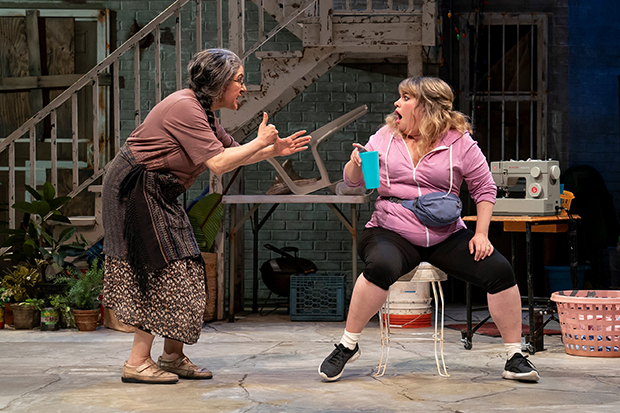
(© Joan Marcus)
Between the hilarious Aspillaga and Santiago (who keeps us laughing with her perfectly timed murmurs of disapproval), this is easily the funniest Medea since Charles Ludlam's 1984 adaptation. But anyone familiar with Euripides knows that the laughter can't last in this darkest of tragedies.
Director Chay Yew employs an impressive range of theatrical tools to tell a story that is both ancient and modern. Arnulfo Maldonado's set has a thrusting layout fit for a Greek amphitheater, but the treatment is unmistakably Queens, right down to the peeling paint on the back patio. Lighting designer David Weiner, sound designer Mikhail Fiksel, and projection designer Stephen Mazurek transport us into Medea's shadowy memories: Moving lights and the sound of a helicopter bring an ICE raid into the theater (a scene that feels particularly urgent this week). Haydee Zelideth conveys the aspirational nature of clothing in her costumes: Medea's flowing white dress feels increasingly foreign next to Jason's burgeoning country-club look. All of the characters in Mojada may be Latinx, but it's hard to make an argument that they're part of the same tribe.
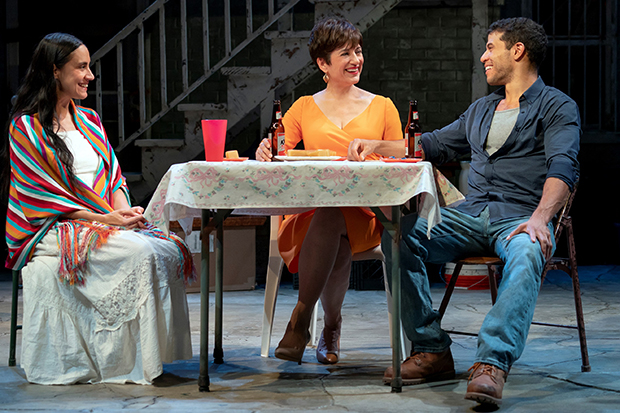
(© Joan Marcus)
Yew endows the scenes between Pilar and Medea with mythic importance, but the dramatic tension is pure telenovela, causing the audience to gasp and "oooooo" at this 2,500-year-old story. "You are like a mother to him," Medea remarks to Pilar, desperate to make it true (Zúñiga Varela delivers a sympathetic performance that carries an element of unexplained danger). Peering contemptuously at Medea under a crown of rich-lady hair (perfectly styled by Earon Chew Nealey), Pillar refers to her as "little girl," a phrase Maris drizzles in condescension. Both women know Medea is outclassed, but only Medea realizes that it's not over until she decides it is.
Pilar ought to feel familiar to the audience at the Public. Like Alexander Hamilton, she is an immigrant success story, the kind we fetishize in liberal circles. She arrived on the Mariel boatlift with nothing, and has risen to become a New York City landlord through hard work and strategic marriage ("His name was Blumenthal," she says of her late husband, barely feigning grief). By all accounts, Pilar is living the American dream, but will it ever be enough? How many bodies is she willing to step over in her magnificent pumps on the road to Yanqui Valhalla?
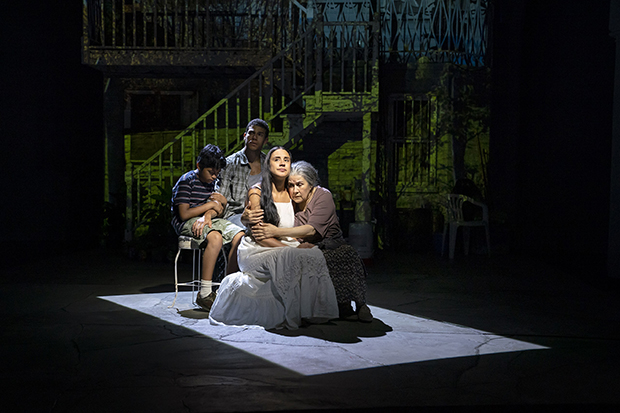
(© Joan Marcus)
The American dream has always involved a fair amount of hubris, as poor men and women refuse to accept their fates and build castles seemingly from thin air. But the gods act through the least among us to humble their pretenders, turning those castles to ash. Mojada isn't the story of one deviant mother, but the tragic lack of imagination on the part of a ruling class that thinks the powerless will keep following its rules no matter how far they are pushed.










